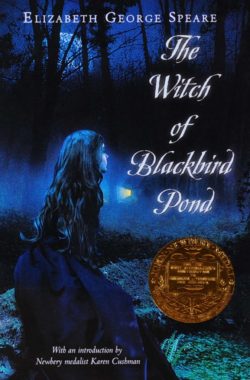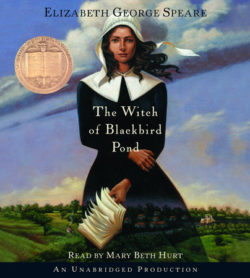 by Elizabeth George Speare
by Elizabeth George Speare
Unconditional Recommendation: Katherine “Kit” Tyler must learn to live in a Puritan community with her relatives but befriends the Witch of Blackbird Pond and risks being persecuted as a witch herself.
Awards: Newbery Medal (1959), Dorothy Canfeld Fisher Children’s Book Award (1960)
From the beginning, this book arrested my attention and held me captive until the end. I loved this book! It’s set in early America during the days of Puritans, Quakers, witch trials, and murmurs of revolution. I can easily understand why this book is studied in a classroom because the story contains historical content and many topics and characters with varying perspectives to discuss. Plus the engaging plot can hold almost any reader’s interest.
Orphaned Kit Tyler knows, as she gazes for the first time at the cold, bleak shores of Connecticut Colony, that her new home will never be like the shimmering Caribbean island she left behind. In her relatives’ stern Puritan community, she feels like a tropical bird that has flown to the wrong part of the world, a bird that is now caged and lonely. The only place where Kit feels completely free is in the meadows, where she enjoys the company of the old Quaker woman known as the Witch of Blackbird Pond, and on occasion, her young sailor friend Nat. But when Kit’s friendship with the “witch” is discovered, Kit is faced with suspicion, fear, and anger. She herself is accused of witchcraft!
- The hostility of the Puritans towards the Quakers
- Branding, stocks, whipping and jail time for being Quaker
- Witch trials
- An American colony experiencing unjust rule by England authorities
I find the goodness in this book fascinating because it shows how what is true and right can transcend culture. The Puritans’ ideas of right and wrong sometimes completely contrast what’s actually right and wrong and Kit must choose which hill she’s going to stand and die on.
This book is full of examples of characters doing what’s right even when no one else will. It’s a testament to doing the right and good action even in the face of slander, opposition, or the unreasonable behavior of other people. This book applauds that kind of bravery.
From a Christian viewpoint, we can see how the strict, solemn Puritan lifestyle saps the joy and freedom from life—a great example of legalism verses grace. Christian legalism says that the believer must do and not do certain things in order to be and remain accepted by God. The Bible preaches grace. Grace says there’s nothing a believer can or cannot do to change the fact that they’re accepted by God because of their position in Jesus Christ. The believer can experience a life of great joy and freedom because of the grace of God and this book shows how legalism can squelch this goodness. There may not be Puritans these days, but there are plenty of legalists.
All the characters are fascinating and unique, especially set in that time in history! I enjoyed all of them and how they lent such variety and reality to the story.
Katherine “Kit” Tyler – Kit embodies freedom, goodwill, and the zest of life and to her dismay, the world of the Puritans has no place for a person such as that. I love that she never loses her lightheartedness—sure, she becomes discouraged at times but her light spirit is never truly extinguished throughout the trying circumstances and oppressive culture.
Nathaniel “Nat” Eaton – he’s a quiet character who’s personality is hard to put your finger on. However, as the story unfolds so does Nat’s goodness. Kit and Nat start as hesitant friends, more at odds than comfortable with each other, but their relationship grows as they discover a shared compassionate spirit.
 Mercy Wood – this character is appropriately named because in a world of hard work and strict social constructs, Mercy provides grace, kindness and patience to any situation. She’s humble and a character, who much like the Apostle Paul learned “whatever state I’m in to be content.” She never complains, listens well, is compassionate towards everyone and functions as the loving glue that keeps everyone from flying apart.
Mercy Wood – this character is appropriately named because in a world of hard work and strict social constructs, Mercy provides grace, kindness and patience to any situation. She’s humble and a character, who much like the Apostle Paul learned “whatever state I’m in to be content.” She never complains, listens well, is compassionate towards everyone and functions as the loving glue that keeps everyone from flying apart.
Judith Wood – where her sister, Mercy, is gentleness and submission, Judith is bluster and rudeness. She has a mind and will of her own and is not above making harsh comments, displaying her arrogance, or attempting to force her will on a situation with no thought for anyone else. She’s a selfish person. I think, given the circumstances, one could either respond by being like Mercy (submissive, content) or Judith (rebellious, bitter). She functions as a contrast to both Mercy and Kit’s characters and it only makes kindness and goodness shine more brightly.
Rachel Wood – is a kind and loving person whose kindness is sometimes repressed by her husband and the Puritan way but other times she cannot contain it and must show compassion even in the face of disapproval such as sending some food with Kit when she goes to visit the forbidden Witch of Blackbird Pond.
Matthew Wood – he’s a complex character that’s tricky to figure out. Often he’s the picture of the Puritan’s unbending legalism but then Kit gets a glimpse of the goodness beneath when he makes allowances on Mercy’s behalf or looks out on a field of harvest with pleasure.
Hannah Tuppens – the Quaker “witch” who lives alone becomes a shelter of peace, wisdom, and grace to Kit and Prudence. Appearances and slander fall away when Kit experiences the kindness and goodness of the “horrible witch.” It’s interesting to read about a character who just wants to live in peace and maybe have some friends but is targeted for being Quaker and not attending Puritan meetings.
Prudence – Kit meets the young girl while aboard The Dolphin on their way to Connecticut. Prudence has a horrible mother who barely feeds and clothes her and proclaims her to be too dull to learn anything. Through the instruction and friendships of Kit, Nat, and Hannah, Prudence learns to read, write, and stand up for what’s right even in the face of her mother’s wrath. I loved watching characters take her under their wings and how she blossomed in their care.
This book does an excellent job of keeping the reader engaged with perfectly timed twists in the plot. The story begins with a sense of foreboding as Kit’s unusual ways inspire disapproval and anger in the strict Puritans and the reader is kept on edge as to how Kit is going to survive in such a community. When she is finally accused of being a witch and members of the community take action, I was on the edge of my seat hardly daring to hope things might turn out alright in the face of such ignorant, hateful slander. Elizabeth George Speare exhibits excellent storytelling by building up the suspense, drawing it out, and delivering satisfying resolutions.
I cannot imagine living in such a time, in such a harsh community or enduring unjust or unfounded criticism or disapproval. Seeing those things through the eyes of an innocent outsider such as Kit fascinated me and I found myself thinking about the Puritans—how needless and harmful their strict lifestyle could be—long after the book was closed. As Christians, we can face the same conflicts when we come up against legalism in Christianity—the rules Christians make for living that are, in fact, unbiblical though some claim otherwise. This book gives the reader the sense of oppression and undue seriousness of a lifestyle dominated by rules while the characters of Kit, Mercy, and even Rachel shine as lights of grace.
The story of each character ends at a different time and by the end the reader is invested in the outcomes of not just Kit, but Mercy, Judith, Nat, Hannah, and Prudence. What will become of each of them after such a turbulent year? All of their ends were fitting and greatly satisfying. This book is captivating, thought-provoking, and satisfying from beginning to end!
